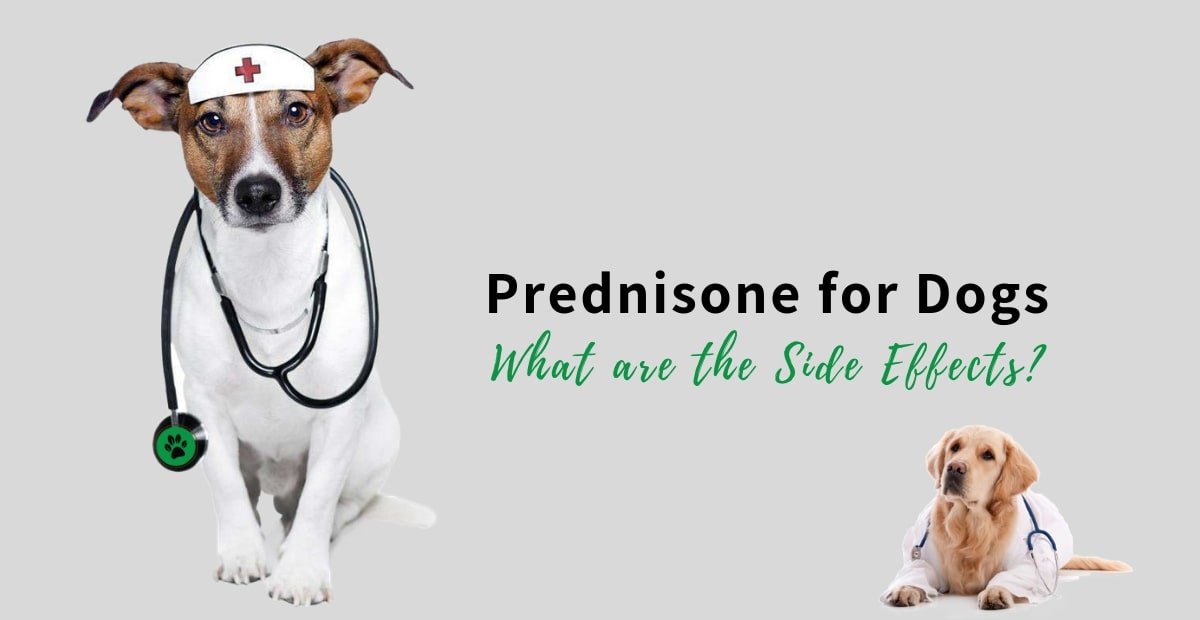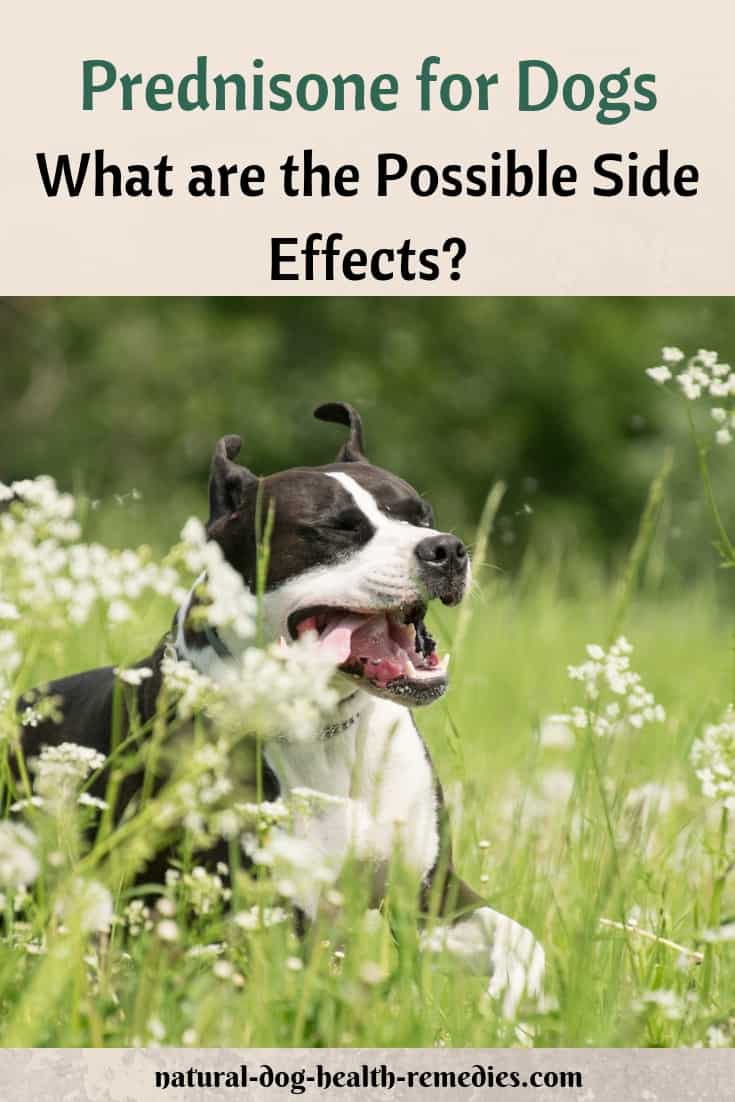Prednisone for Dogs

Overview
Corticosteroids (steroids in short) such as prednisone are common dog allergy medication prescribed by veterinarians to relieve the itchiness in the allergic dog.
Corticosteroids are anti-inflammatory, pain-relieving, and itch-relieving. When used correctly, they are very effective in relieving allergy symptoms in dogs. They are fast acting and can relieve itching, decrease inflammation, and reduce redness, swelling and pain caused by inflammation in less than 24 hours.
At the same time, however, they can decrease the ability of wounds to heal and increase the chance of infection. At high dosages, they also suppress the body's immune system.
The key to successful use of steroids such as prednisone for dogs is to use the medication correctly, at the right dose, for the proper length of time, and in the right patient.
Unfortunately, this is not always the case.
Some veterinarians regard corticosteroids as the "wonder drug" and prescribe the medication all too frequently and inappropriately. As dog parents, we need to educate ourselves as to when it is appropriate to use steroids and the possible side effects that the medication can cause.
Types of Corticosteroids
There are three types of corticosteroids - mineralocorticoids, sex steroids, and glucocorticoids.
In veterinary medicine, the glucocorticoids are the predominant steroids used, so when a vet says he is going to prescribe "corticosteroids" for a dog's allergy symptoms, he is referring to glucocorticoids.
Examples of corticosteroid products are those typically with names ending in "-sone", e.g. hydrocortisone, prednisone, prednisolone, dexamethasone, betamethasone, triamcinolone, and others.
These different medications are classified by their strength and duration (time of effectiveness in the body).
Duration of Some Common Corticosteroids for Dogs
The duration of a corticosteroid means how long a dose exerts its effects in the body.
Some corticosteroids such as dexamethasone and betamethasone are very long lasting and can act for weeks and last in the body for several months. These corticosteroids are very harmful if used repeatedly and for long periods of time.
Here is a list of common corticosteroids and their duration:
| Corticosteroid | Potency | Duration |
| Hydrocortisone | 1 | 8-12 hours |
| Prednisone or prednisolone | 4 | 12-36 hours |
| Methylprednisolone (Solu-Delta) | 5 | 12-36 hours |
| Triamcinolone (Vetalog) | 5 | 12-48 hours |
| Dexamethasone (Azium) | 30 | over 48 hours |
| Betamethasone (Betasone) | 35 | over 48 hours |
Side Effects of Corticosteroids on Dogs
Although steroids are fast-acting and can bring about near-immediate relief for the dog patient, some holistic vets are reluctant to use these drugs for a single, but important, reason - side effects.
There are a lot of short- and long-term side effects of corticosteroids.
Short-term side effects include:
- An increase in appetite
- An increase in water intake
- An increase in urine output
Some long-term side effects include:
- Immune system suppression resulting in a decreased ability to resist viral, bacterial, or fungal diseases.
- Gastrointestinal problems such as ulcers, pancreatitis, and GI bleeding.
- Skin problems such as skin infections, hair loss, acne, and excessive bruising.
- Eye problems resulting in glaucoma and cataracts.
- Heart and cardiovascular system problems, such as high blood pressure and water retention.
- Metabolic imbalance resulting in obesity and increased blood fat.
- Kidney and liver diseases.
- Diabetes and changes in glucose metabolism.
- Changes in calcium utilization resulting in osteoporosis, muscle weakness, and possible cartilage destruction.
The most serious and potentially life-threatening long-term side effect of corticosteroids on a dog's body is the possibility of a total shutdown of the adrenal glands.
Glucocorticoids are produced by the adrenal glands and the levels of these hormones within the body are monitored by the brain and the pituitary gland.
However, long term use of glucocorticoids can confuse the dog's body.
In the presence of higher than normal levels of these hormones, the pituitary gland senses no need to produce any and may turn off the adrenal glands completely. This will not hurt the dog too much if a low dose of steroid is administered for a short period of time.
But when the medications are stopped after long-term use, the glands cannot adapt so quickly to produce the hormones up to the normal levels.
Use of Corticosteroids for Dog Allergies
With so many side effects, you may wonder if corticosteroids such as predisone for dogs should be avoided altogether.
Many veterinarians, holistic and conventional alike, believe that short-term, rational use of corticosteroids can be beneficial and effective in treating some dog health problems such as itchiness and skin inflammation caused by allergies.
Because steroids are fast acting, they can quickly relieve discomfort caused by allergies in dogs. Low dosage and low potency should always be considered first. For example, topical use should be considered before oral use or injection.
 Finally, because of their numerous side effects, they should never be used to treat dogs with chronic allergies.
Finally, because of their numerous side effects, they should never be used to treat dogs with chronic allergies.
If your dog has allergies and your vet suggests putting her on long-term "steroid therapy", say "No!" for two reasons.
First, the steriod medication can only alleviate the symptoms; it cannot treat the underlying cause. Your dog can only get relief while she is on steroids. Once the therapy is stopped, the symptoms will return. You need to work with your vet to identify the underlying root cause that makes your dog allergic.
The second and more important reason for rejecting long-term "steroid therapy" for your dog is, putting your dog on steroids for a prolonged period of time will greatly damage her health (as you can see from the long list of side-effects above).
Your dog's immune system will eventually shut down, setting the stage for the development of a debilitating or even life-threatening health problem.

Dog Allergy Treatment
Besides corticosteroids, there are other treatment options for dogs with allergies, such as antihistamines, allergy shots, and of course natural remedies.
Visit our page on Natural Allergy Relief for some natural remedies that can relieve allergy itch. For other treatment options, visit this page.
Eldredge, et al. Dog Owner's Home Veterinary Handbook 4th edition (Wiley Publishing, 2007).
S. Messonnier, The Natural Vet's Guide to Preventing and Treating Cancer in Dogs (New World Library, 2006).
VCA Hospitals, Steroid Treatment Long Term Effects in Dogs.





